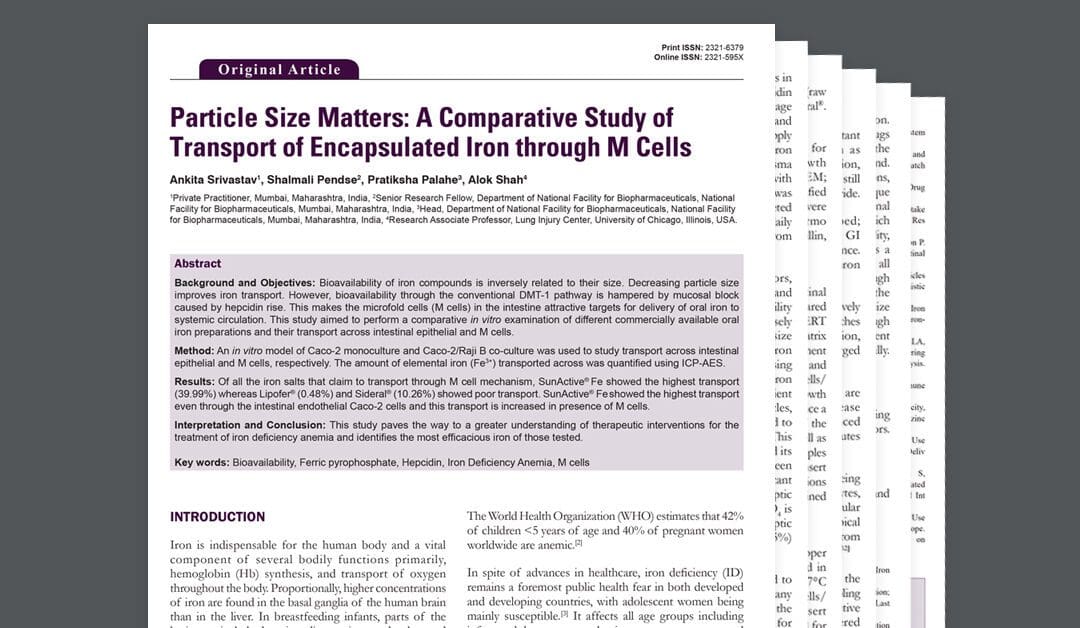A unique absorption pathway may be a big reason why Taiyo’s micronized, encapsulated SunActive Fe has superior bioavailability and why it causes less stomach irritation than other supplemental irons. This was one of the conclusions after researchers compared SunActive Fe with other common and commercially available iron ingredients. Results of this in vitro study were published in the International Journal of Scientific Study.
This is more great news for food, beverage and dietary supplement formulators who want to fortify their products with a research-backed iron that isn’t associated with the typical drawbacks to consumer compliance.
Study evaluated how encapsulated iron ingredients are absorbed
When consumed in the diet, water soluble iron and other soluble minerals are absorbed as metal2+-ions via the divalent metal ion transporter 1 (DMT-1) of the intestinal cells. Because this ion channel absorbs many minerals, they compete in their absorption through DMT-1, resulting in some nutrients not being absorbed efficiently. For example, the absorption of iron from a soluble iron source is inhibited by the calcium of milk when consumed together.
A preliminary in vitro study (Kim 2017) showed SunActive Fe to be absorbed via endocytosis through the Microfold (Mcells) in the intestines.
Endocytosis is a cellular process by which cells take in materials from their external environment by engulfing them with their cell membrane. It is a form of active transport that allows cells to internalise various substances, including nutrients, signalling molecules, pathogens, and cellular debris. Because this is a novel pathway for iron absorption that is different from all other iron absorption pathways, it could explain SunActive Fe’s better bioavailability versus other iron pyrophosphate materials that are made of particles that are too large to be absorbed by endocytosis. Plus SunActive Fe has a superior safety profile versus soluble iron supplements.
The present study was performed in two different cell models Caco-2 and Raji-B-cells. Caco-2 cells can absorb iron via the DMT-1, and they also can perform endocytosis. In the Caco-2 cells SunActive Iron was already better absorbed (27%) than 2 other iron pyrophosphate sources (13% and 16% respectively). The second part of the study used a two-cell culture model of combining Caco-2 cells with Raji-B cells. Raji-B cells are human B lymphocytes (B cells) that specifically perform endocytosis and are therefore able to absorb SunActive Fe particles directly.
The results show that SunActive Fe was around 2- 4 times better absorbed compared to other iron pyrophosphate products.
The model replicating just absorption via M cells found that SunActive Fe yielded 40% iron transport compared with the competitors’ 10.26% and 0.48%. “This nearly four-fold enhanced absorption via M cells compared to the nearest competitor shows the special properties that SunActive Fe possesses due to its patented technology,” observes Derek Timm, PhD, RDN, who serves as Taiyo’s functional ingredient technology expert.
A particle analysis of the three iron pyrophosphate sources showed that the average particle size of SunActive Fe was more than 50-100 times smaller than that of the other iron pyrophosphate sources, whose average particle size was around 20-40 µm. Such large particles cannot be absorbed by endocytosis. The large difference in the particle sizes of the three iron pyrophosphate sources seems to be the reason for the higher bioavailability of SunActive Fe versus other iron sources.
More reasons to choose SunActive Fe
SunActive Fe’s patented delivery system creates endosomal iron pyrophosphate particles that perfectly disperse in water creating a stable dispersion. The particle size is small enough to be directly absorbed by cells via a process called endocytosis, which is a well-known absorption pathway of liposomes. SunActive Fe is useful for various applications, as it is stable against heat, salt, pH, and oxidation.
Consumers are very likely to notice the SunActive difference because SunActive Fe does not cause stomach irritation nor have a metallic iron taste. Also, SunActive Fe will not stain teeth, cause black stools, constipation or other issues common with other iron supplements.
SunActive Fe is non-GMO, vegan and kosher. It is recommended by the World Health Organization as an ideal fortificant, and identified by the European Food Safety Authority as a source of iron in its approved health claims. It is suitable for infant nutrition.
Because SunActive Fe is less reactive with food materials, it is ideal for fortifying foods, beverages and dietary supplements including powdered drink formulas.
